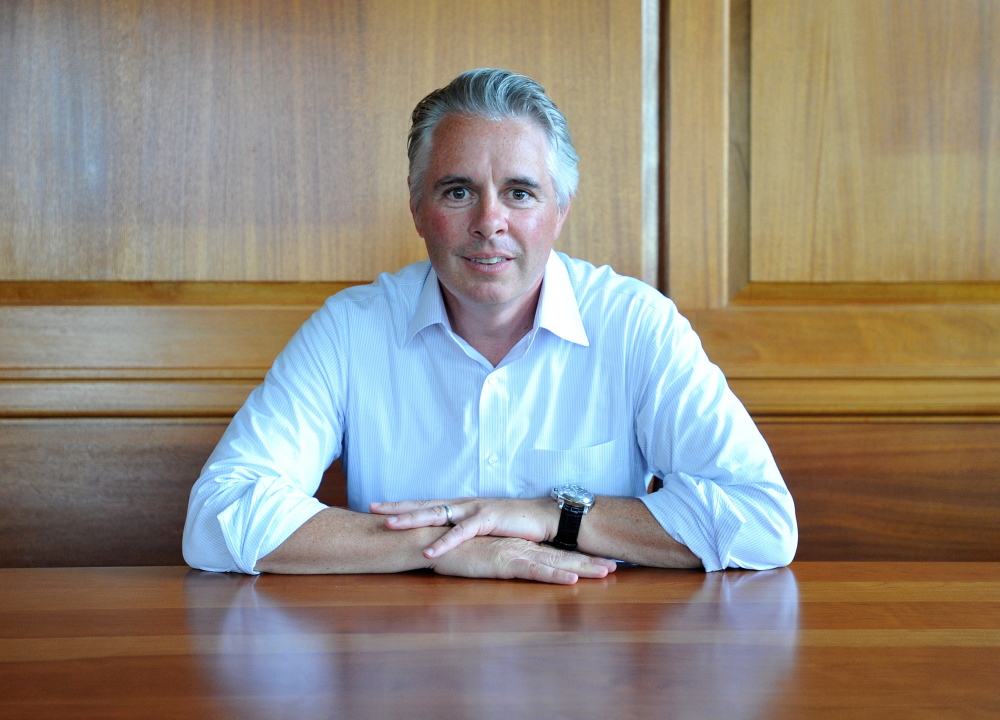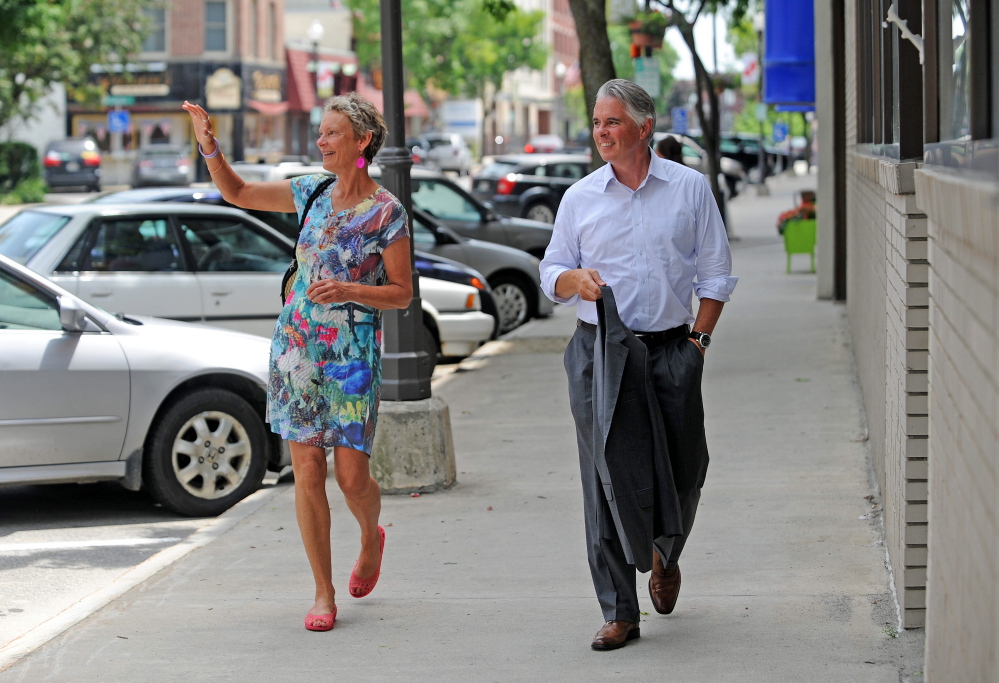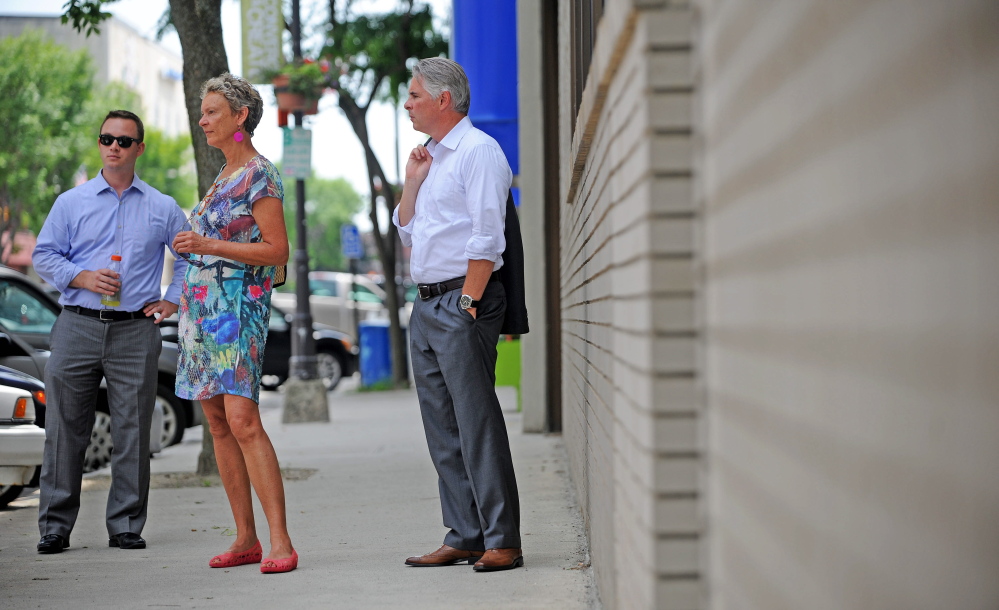WATERVILLE — Following lunch at Barrels Community Market, David Greene, the new president of Colby College, walked through downtown Waterville with Mayor Karen Heck and socialized with students and staff over ice cream on campus Tuesday afternoon.
Greene, who took office on Tuesday, arrived in Waterville just the day before but said he felt invigorated to be on campus. He comes to Maine from the University of Chicago, where he served as executive vice president since 2011.
He spent most of his first day at Colby visiting the various academic departments and familiarizing himself with the 714-acre campus, but also set aside time to talk with Heck about how the city and college can collaborate.
“There are great things happening in Waterville right now, and there’s even more potential if everyone works together to develop a shared vision for how Waterville can become an even more vibrant and dynamic place,” said Greene, 51, from his new office in Eustis Hall. “We spent a lot of time talking about what those opportunities are and how Colby can contribute to making Waterville a great place to live and work.”
Working with the city on economic and cultural projects is one of several goals Greene has outlined for his administration as he takes over as the 20th president of the college. One of his other top priorities will be to increase the number of applications to the school, something he says will help add diversity to the student body.
“I think there’s a very symbiotic relationship between Colby and Waterville,” said Heck, who is a 1974 graduate of Colby and is not running for reelection as mayor this fall. “The town and the college have been really good partners in making sure each survives, and I’m looking forward to expanding that opportunity.”
Originally from Worcester, Mass., Greene worked odd jobs in Ogunquit while a student at Hamilton College in upstate New York. His mother’s family has roots in Madison and Millinocket, and he said family members, including three children who will attend Waterville schools and his wife, Carolyn, are excited to be in Waterville.
“Maine is an extraordinary state. It has a sense of place that’s unusual and incredibly attractive,” Greene said. “I think Waterville has a lot of the same things — people that grew up here have the deepest and fondest feelings about this place. Not all communities have that. Waterville does, and it means a lot to me.”
It’s also something that Greene says he thinks the college can build on to attract new students. One of Greene’s top goals is to attract more applicants to the college and by doing so, increase the diversity of the student body.
During the eight years that Greene spent at the University of Chicago, where he was vice president of strategic initiatives before becoming executive vice president, the number of applications increased from about 9,000 per year to about 30,000 per year, according to Julie Peterson, the school’s vice president of communications.
“He was a critical leader both in recruiting the expertise needed to make that happen and then supporting those expert leaders,” Peterson said.
Colby College had 5,148 applications for the Class of 2018 — a number Greene is seeking to double — and has a 28 percent acceptance rate. About 13 percent of the student body comes from Maine, according to the college.
Students who come from different backgrounds and different parts of the country and world challenge each other and have more meaningful discussions and discoveries, a major part of a liberal arts education, said Greene.
“You want people who are always thinking about things at a slightly different angle, who are pushing you to think different about things,” he said. “Whether its racial and ethnic, political, socio-economic or cultural, all of those things end up making a huge difference in the way people view the world and the way they understand and overcome problems, and that’s a big part of education.”
Greene holds two master’s degrees and a doctorate from Harvard University and has worked in administration at Smith College and Brown University. He said it’s important to him to make a difference on the issue he cares about most — educational opportunity and access. He says that philosophy also extends to the Waterville community.
Cultural and arts development is a priority Greene brings with him from his time in Chicago, where he worked to redevelop and bring more retail opportunities into the Hyde Park neighborhood on the mid-south side of Chicago surrounding the university.
“We felt we needed more amenities for faculty, staff and students we were recruiting, and we also knew the community really wanted a more vibrant economic climate — more jobs, more shopping, more interesting places to go to eat dinner,” said Peterson. “We didn’t have a lot of that in Hyde Park and now we do. We have this really thriving commercial corridor, and he led all of the teamwork.
“There were community and civic relations; there were relationships with the city and local elected officials. All those relationships required a lot of outreach and connecting, and he did that.”
Heck said she hopes to expand Waterville’s connection with the college under Greene’s leadership. The school has already been instrumental to the city in many ways, including promoting economic development, community service and financial funding, she said.
Under Greene’s predecessor, William “Bro” Adams, the college was involved in several arts initiatives, including the Maine Film Center’s Railroad Square Cinema and the Maine International Film Festival and a renovation of the Waterville Opera House. Colby also donated $100,000 to the creation of trails at the Quarry Road Recreational Center; donated funds in 2013 to the repaving of Mayflower Hill Drive, part of which runs through campus; and loaned $1 million for the redevelopment of the Hathaway Creative Center.
As a nonprofit organization, Colby College is exempt from paying taxes to the city. As the city has struggled through cuts in municipal revenue sharing, at least one city councilor has suggested that Colby should be paying some amount of taxes.
Heck says the college has found other ways to contribute that are perhaps more important than paying directly for city services through taxes.
“In some ways I think that their ability to really look at things through a wider lens rather than just contributing to the general fund at the city level is really a benefit. I think that gets overlooked,” Heck said.
Students and staff on campus said they were excited to welcome Greene to campus this week.
“I think we’re all very eager to see what sort of changes he has in mind,” said Ellen Doble, administrative secretary to the vice president and dean of admission and financial aid. “I know he wants to raise our number of applications to almost double what they are now. It’s an ambitious target, but we are excited for the challenge.”
The push to bring more applicants to the school is a good thing, according to Colby junior William Lin, who said the campus could use more diversity.
“The benefit to us is that we’re interacting with people we normally wouldn’t,” he said. “The same thing is true for interacting more with the community. It’s nice to give back, and it forces you to meet people you otherwise might not.”
Rachel Ohm — 612-2368
Send questions/comments to the editors.






Success. Please wait for the page to reload. If the page does not reload within 5 seconds, please refresh the page.
Enter your email and password to access comments.
Hi, to comment on stories you must . This profile is in addition to your subscription and website login.
Already have a commenting profile? .
Invalid username/password.
Please check your email to confirm and complete your registration.
Only subscribers are eligible to post comments. Please subscribe or login first for digital access. Here’s why.
Use the form below to reset your password. When you've submitted your account email, we will send an email with a reset code.